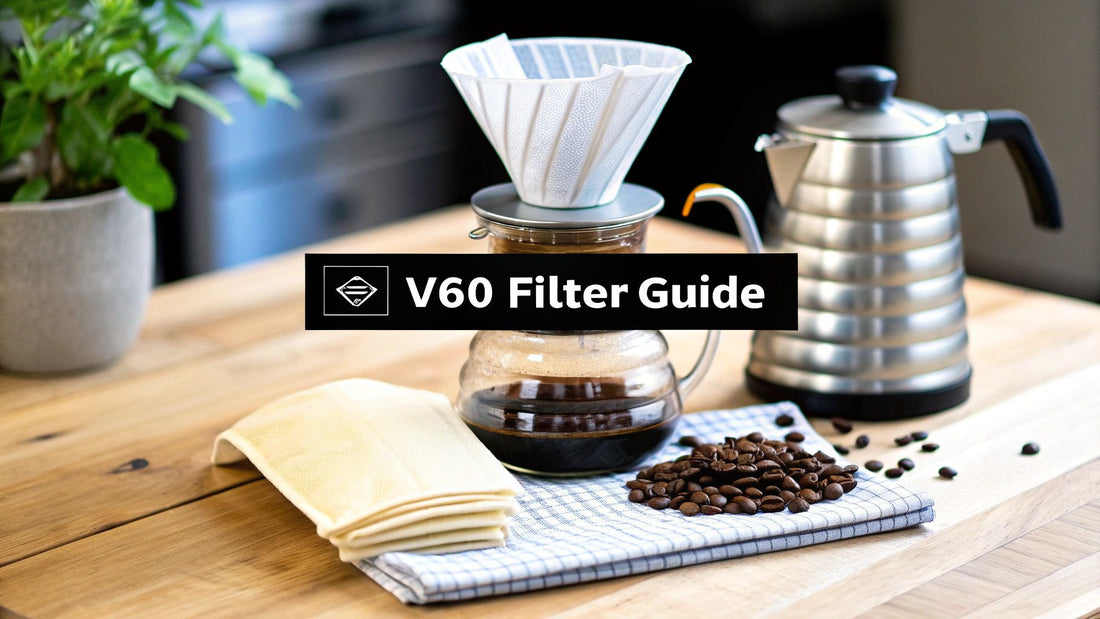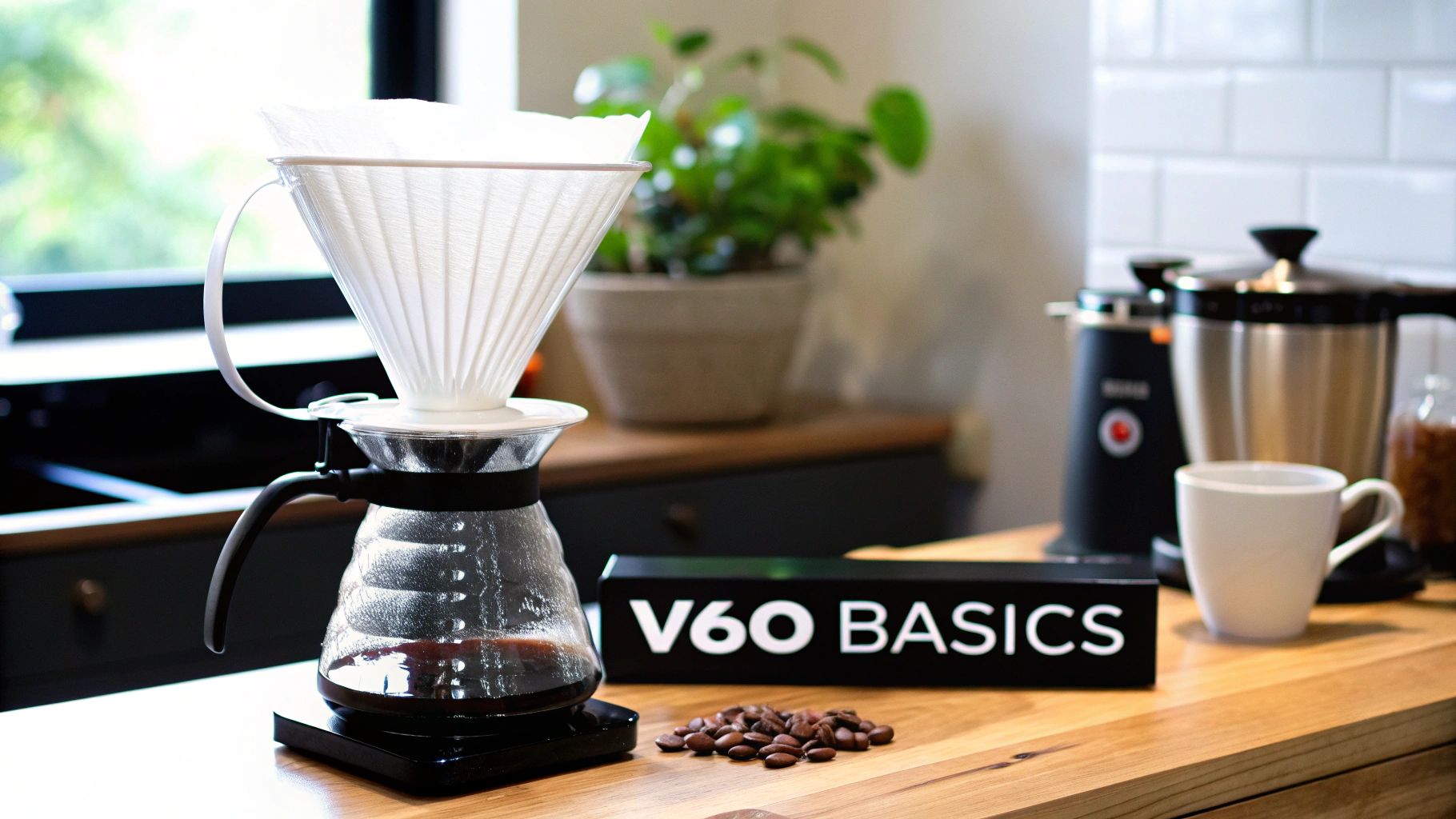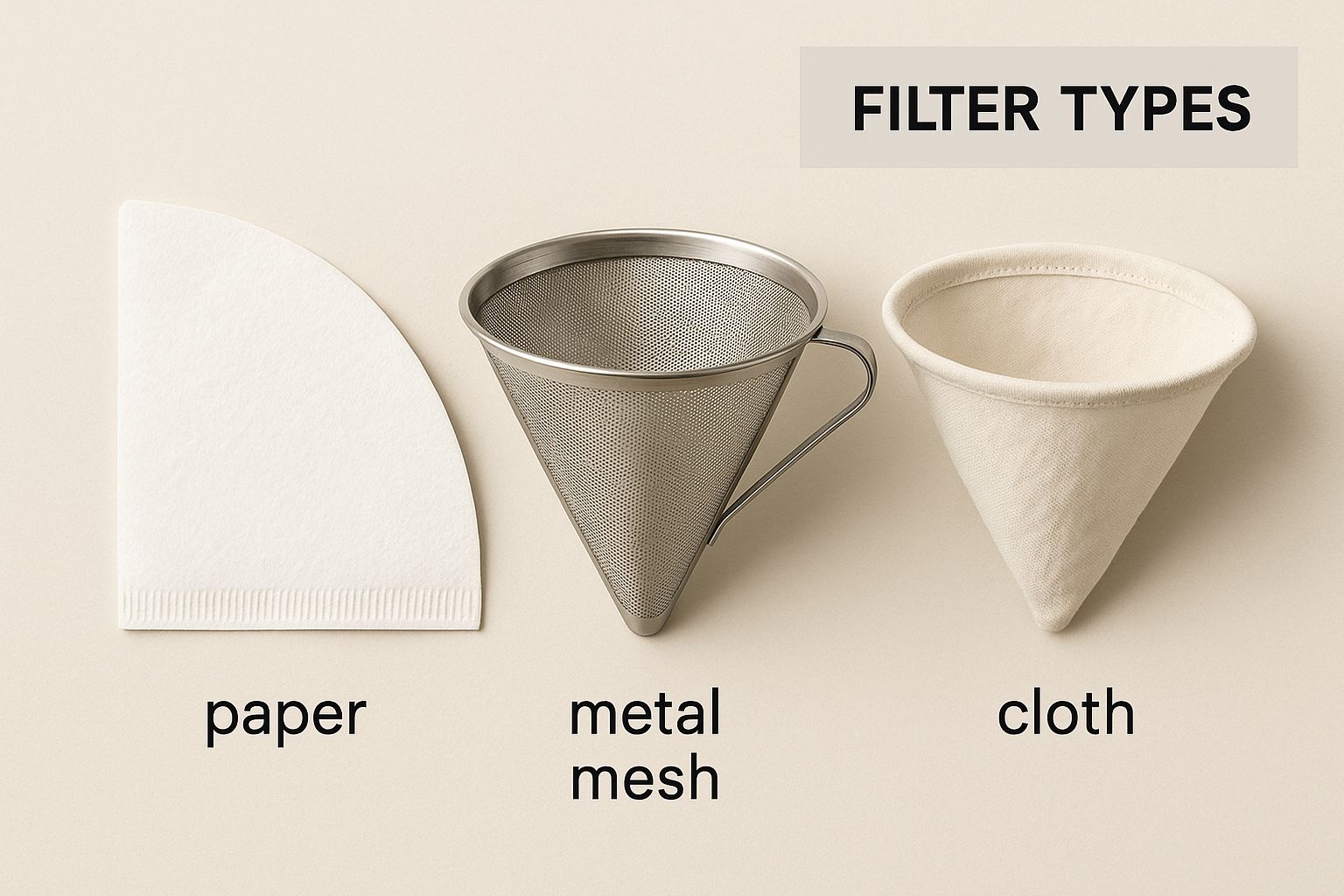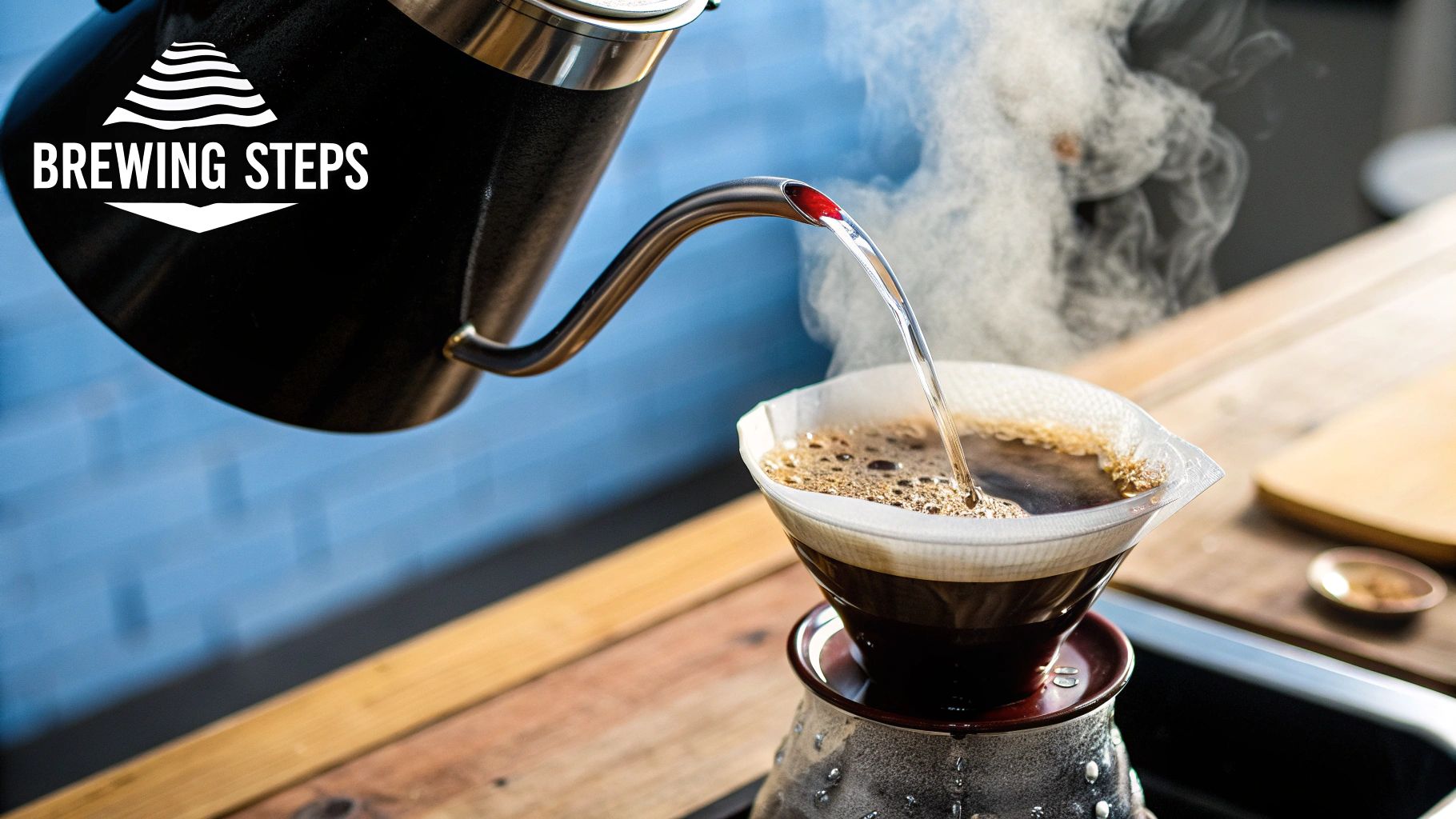
Choosing V60 Coffee Filters: A UK Brewer's Guide
Share
Welcome to the definitive guide for any UK coffee lover looking to master the V60. The real secret to unlocking its potential isn’t in some arcane pouring technique; it's in your choice of V60 coffee filters. The subtle differences between paper, metal, and cloth can completely change the flavour, body, and even your daily brewing ritual.
The Secret to Your Perfect V60 Brew

The V60 is a cornerstone of the UK’s speciality coffee scene, loved for the incredible control it offers. Whether you’re a home-brewing newcomer or a seasoned barista, getting to grips with your filter is the key. This guide is all about giving you actionable insights to elevate every single cup.
First appearing back in 2004, the iconic cone-shaped V60 completely changed the game for manual brewing with a design that pushed extraction to its limits. Its ability to produce a cup with stunning clarity and consistency made it an instant favourite in the UK coffee community, especially as interest in speciality coffee exploded from the early 2010s onwards. If you're curious, you can dive deeper into the evolution of coffee filters on Wikipedia.com.
In this guide, we'll be focusing specifically on how each filter choice—paper, metal, or cloth—stacks up in the real world for UK coffee drinkers.
Exploring the UK's V60 Coffee Filter Scene
The UK's love affair with speciality coffee has well and truly come home. What started in bustling independent cafés has found a permanent place on our kitchen counters, with more of us embracing the ritual of manual brewing. This shift is driving a huge demand for quality kit, especially v60 coffee filters, where the choice of material is as important as the beans themselves.
This isn't just a niche trend; it's part of a global market expected to hit over $1.1 billion by 2035. The UK is a key player here, with our home-brewing habits fuelling steady growth. You can read the full research about the coffee filter paper market on futuremarketinsights.com for a deeper dive.
For V60 brewers in the UK, three main options have emerged: the classic paper, the sustainable metal, and the artisanal cloth filter. Each one takes you on a distinctly different path to your perfect cup. To understand just how much the little details matter, it helps to look at the wider coffee world, including insights from professional coffee shop designs, where every element is chosen with intention.
These three materials set the stage for our deep-dive comparison. Let's get into it.
Paper, Metal, or Cloth? Finding Your Perfect V60 Filter
Choosing your V60 filter is where the real magic happens. It’s a decision that fundamentally changes your final cup, shaping everything from the flavour profile to the very feel of your daily brewing ritual. For UK coffee lovers chasing that perfect single-origin experience, understanding these differences is everything.
Each material interacts with the coffee grounds in its own unique way.

As you can see, this isn't just a simple choice of material; it's about defining your brewing philosophy. Do you crave clarity or body? Are you focused on sustainability or convenience? Let's dive deeper.
Paper Filters: The Purist's Choice
Paper is the classic V60 filter, and for good reason. Its fine-pored structure is incredible at absorbing coffee oils (known as cafestol) and the finest sediment. The result? A stunningly clean, bright, and light-bodied cup.
This clarity is what allows the delicate, nuanced flavours of a high-quality single-origin coffee to really sing. Think bright citrus, subtle floral notes, and a tea-like finish. If you’re brewing a complex Ethiopian or a crisp Kenyan from a UK roaster, a paper filter is your best friend.
Metal Filters: For Lovers of Body and Texture
If you find paper-filtered coffee a bit too thin for your liking, a metal filter will be right up your alley. Made from stainless steel with micro-perforations, these filters allow all the natural oils and some ultra-fine grounds to pass straight into your cup.
This creates a brew that's rich, full-bodied, and has a much heavier mouthfeel. You lose some of the flavour separation you get with paper, but you gain a wonderful texture and a bolder, more rounded profile. It's a fantastic, eco-friendly option for those who enjoy a more traditional, robust coffee experience, similar in body to a French Press.
Cloth Filters: The Silky Middle Ground
Sitting somewhere between paper and metal, you'll find the cloth filter. Often made from organic cotton, these filters let some oils through while still trapping the sediment. This strikes a beautiful balance.
You get a brew that has more body and a silkier texture than paper, but with more clarity and less grit than a metal filter. They require a bit more upkeep—rinsing after each use is a must—but the unique, well-rounded cup they produce is a reward in itself.
Your filter is the gatekeeper of flavour. Paper creates brightness, metal delivers body, and cloth offers a unique, silky middle ground.
To help you decide, here’s a quick summary of how they stack up against each other.
V60 Filter At-a-Glance Comparison
This table breaks down the core differences to help you find the filter that best suits your taste and lifestyle in the UK.
| Attribute | Paper Filter (Bleached/Unbleached) | Metal Filter (Stainless Steel) | Cloth Filter (Organic Cotton) |
|---|---|---|---|
| Flavour Profile | Very clean, bright, high clarity, light body | Full-bodied, rich, robust, less clarity | Balanced, silky mouthfeel, medium body |
| Oils & Sediment | Absorbs almost all oils and sediment | Allows all oils and some fine sediment | Allows some oils, blocks most sediment |
| Best For | Highlighting delicate, nuanced single-origins | Rich, bold coffees; lovers of French Press | Achieving a balance of clarity and texture |
| Sustainability | Disposable (compostable if unbleached) | Highly reusable, very low waste | Reusable for months, eventually compostable |
| Ease of Use | Very easy, just dispose after use | Easy to use, requires a thorough rinse | Requires immediate rinsing and periodic deep cleaning |
| Cost | Low initial cost, ongoing expense for refills | High initial cost, no ongoing expense | Moderate initial cost, needs replacing every few months |
Ultimately, there's no single "best" filter—only the one that’s best for the coffee you're brewing and the experience you're after. Many UK coffee enthusiasts keep all three on hand, switching between them depending on the beans and their mood. We highly recommend experimenting to discover your own preference.
Right, let's move from theory to practice. Knowing when to use each V60 filter is what really elevates your coffee game. It’s about matching the filter to the moment, the beans, and the kind of morning you’re having.
This is where you turn a simple brewing step into a genuine part of your coffee ritual. Let’s walk through a few real-world scenarios.
For the Quick Morning Coffee
It’s a busy weekday morning. You need good coffee, and you need it now. No fuss, no faff. This is where paper filters are your best friend.
They’re designed for speed and consistency, giving you a bright, clean cup with almost zero effort. Cleanup is even faster—just lift it out and you're done. It’s the perfect way to get a reliably delicious brew that won’t slow you down.
For the Weekend Single-Origin
The weekend is here, and so is that special bag of single-origin beans you picked up from your favourite UK roaster. To do justice to its delicate floral or vibrant fruity notes, the cloth filter is the one to reach for.
It lets just enough of the coffee’s natural oils through to create a wonderfully silky body, but still keeps the flavour profile exceptionally clear and articulate. It’s the ideal filter for exploring complexity and nuance.
For Hosting Fellow Coffee Lovers
When you're brewing for friends who really appreciate a great cup, you want to make something memorable. A metal filter is perfect for this.
It creates a rich, full-bodied, and textured brew by allowing all the natural oils to pass into the cup. It’s brilliant for making slightly larger, impressive batches that really make a statement. Plus, its sustainable, zero-waste nature is always a great talking point for eco-conscious guests.
Mastering Your Technique with Each Filter

Every V60 filter type responds to slightly different handling. To truly get the best from your brew, mastering these small adjustments is key. It’s what turns a good coffee into a genuinely exceptional one.
When using classic paper V60 coffee filters, a thorough pre-rinse with hot water is non-negotiable. This simple step gets rid of any papery taste and, just as importantly, preheats the brewer and your server. Water passes through a typical paper filter in about 1 minute and 40 seconds, a flow rate that dictates your extraction, so this first step is crucial for flavour clarity. You can find more insights on V60 filter permeability over at greenplantation.com.
With a metal filter, the main challenge is managing the sediment. We’d recommend using a slightly coarser grind than you would for paper to stop the finer particles from slipping through. You’ll also need to be diligent with cleaning to prevent coffee oils from building up and turning rancid.
For cloth filters, consistency comes from proper care. Rinse it immediately after you’ve finished brewing and store it correctly—either submerged in water in the fridge or frozen—to prevent any off-flavours from developing and ensure it lasts.
Right then, let's get you sorted. We've journeyed through the subtle worlds of paper, metal, and cloth V60 filters, and now it’s time to decide which one truly belongs in your kitchen. The "best" filter isn't a universal trophy; it's about what fits your personal taste, your daily routine, and the kind of coffee moment you want to create for yourself.
Your ideal filter is the one that brings you the most joy with every single pour, transforming a simple routine into a rewarding experience.
If your goal is a brilliantly clear, bright cup with zero fuss and an easy clean-up, then paper filters are, without a doubt, your best bet. They’re consistent, reliable, and perfect for a quick, elegant brew.
For those who lean towards a richer, more full-bodied coffee and appreciate a buy-it-once, sustainable approach, a metal filter is a fantastic workhorse that will serve you well for years.
But, if you're a true brewing enthusiast—someone who loves the craft and seeks a silky, uniquely balanced cup—then the cloth filter offers a reward that is truly special. It demands a bit more care, but the results are absolutely worth it.
Your V60 Filter Questions, Answered
Even after you've picked your filter, a few questions always seem to pop up. Let's clear up some of the most common queries we hear from brewers in the UK, so you can press on with complete confidence.
Do I Really Need to Rinse Paper V60 Filters?
Yes, absolutely. Rinsing your paper filter with hot water before adding coffee grounds is non-negotiable for two key reasons. First, it washes away any residual paper dust that can leave a flat, papery taste in your final cup. Just as importantly, it preheats your V60 dripper and server, which is crucial for maintaining a stable brewing temperature right from the start.
How Do I Stop My Metal V60 Filter from Clogging?
Keeping a metal filter clear comes down to two things: your grind size and your cleaning routine. You'll want to stick to a medium-coarse grind, as anything finer will quickly get stuck in the tiny holes of the mesh. Immediately after each brew, give the filter a thorough rinse with hot water from both sides to dislodge any loose grounds.
For a deeper clean, especially if you're in a hard water area in the UK, try soaking your metal filter once a week. A good soak in a solution of hot water and a dedicated coffee equipment cleaner will dissolve those stubborn coffee oils that a simple rinse can't touch, keeping your brews tasting fresh and clean.
Are Unbleached or Bleached Paper Filters Better?
This one often comes down to personal taste, but there's a clear preference in the UK speciality scene. Most professional baristas and serious home brewers lean towards oxygen-bleached filters because they are completely neutral. They don't impart any flavour, letting the coffee's own unique notes take centre stage. Unbleached filters, while more natural-looking, can sometimes add a subtle woody or papery taste if you don't rinse them extremely well.
At Ue Coffee Roasters, we believe the right tools inspire better coffee. Explore our selection of premium brewing equipment and find the perfect V60 coffee filters to elevate your home brewing. Discover your next favourite cup at uecoffeeroasters.com.
